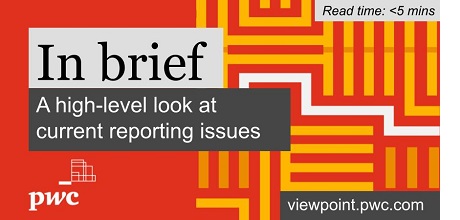Key points
On 12 September 2023, the IFRS® Interpretations Committee (‘the Committee’) concluded its discussion on an agenda decision about how an insurer accounts for premiums due from intermediaries. The Committee concluded that, in the case described in this In brief, such premiums could be accounted for by applying either IFRS 17, ‘Insurance Contracts’, or IFRS 9, ‘Financial Instruments’.
What is the issue?
In the case considered by the Committee, an intermediary collects premiums from policyholders on behalf of an insurer. At the reporting date of the insurer, the intermediary has received premiums in cash from the policyholder but has not yet transferred those premiums to the insurer.
The policyholder has discharged its obligation under the contract, and so the insurer is obliged to provide insurance services to the policyholder, regardless of whether the intermediary fulfils its obligation to transfer the premiums to the insurer. The insurer has no right to recover the premium from the policyholder or to cancel the contract.
In this situation, a question arose in practice as to whether the premiums receivable from the intermediary are:
- cash flows within the boundary of an insurance contract applying IFRS 17; or
- a separate financial asset, applying IFRS 9.
Applying A above, the insurer considers that cash flows are removed from the measurement of a group of insurance contracts when the cash flows are recovered or settled in cash. If the insurer applies the general model, it continues to include those premiums receivable in the measurement of the group of insurance contracts until the time when the intermediary passes the premiums on to the insurer. If the insurer applies the premium allocation approach, the liability will not be increased until the premiums are recovered.
Applying B above, the insurer determines that cash flows are removed from the measurement of a group of insurance contracts when the policyholder’s obligation under the insurance contract is discharged. If the insurer applies the general model, the cash flows for the premiums receivable are removed from the measurement of the group of insurance contracts when the policyholder pays the intermediary, and they are recognised as a separate receivable applying IFRS 9. If the insurer applies the premium allocation approach, the insurance liability is increased when the policyholder pays the intermediary, and at the same time a separate financial asset is recognised applying IFRS 9.
The Committee noted that IFRS 17 is silent on when future cash flows are removed from the measurement of a group of insurance contracts (that is, whether they are removed when cash is received by the insurer, or when the policyholder has discharged its obligation under the contract).
On 12 September 2023, the Committee finalised its discussion concluding that an insurer should develop and apply an accounting policy that determines when cash flows are removed from the measurement of a group of insurance contracts following the IAS 8 requirements. The insurer could therefore determine that cash flows are removed from the measurement of a group of insurance contracts when the cash flows are recovered or settled in cash (Approach A) or when the policyholder’s obligation under the insurance contract is discharged (Approach B).
The two approaches result in different balance sheet presentation for the premiums receivable, as well as differing measurement and disclosure requirements.
In particular, regarding credit risk, IFRS 17 and IFRS 9 deal differently with the measurement, presentation and disclosure of expected credit losses of premiums receivable from an intermediary.
If material, an insurer needs to disclose its policy for determining when cash flows are removed from the measurement of a group of insurance contracts.
|
What is the impact and for whom?
Insurers can be impacted if they use intermediaries to collect premiums: however, since either approach could be applied, a change in policy would not necessarily be required.
When does it apply?
The finalisation of the agenda decision is subject to the International Accounting Standards Board (IASB) not objecting to it. We expect that this will be presented at the October 2023 IASB® meeting.
For all agenda decisions, companies are permitted ‘sufficient time’ to implement any necessary changes in accounting policy.
Where do I get more details?













